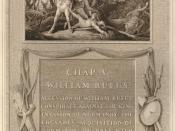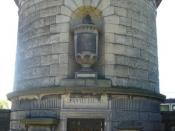� PAGE �1�
Virginia Ford-Eaton
April 3rd, 2010 Philosophy 2306 Mr. Trickett
Let us begin by identifying the present day issue selected for this essay, followed by the philosopher whose perspective I have chosen to explore this matter.
The present day topic is the Don't Ask, Don't Tell policy our military has in effect, and the logical argument for its end. Hume is the philosopher whom I will utilize to explore the subject, incorporating the application of modus ponens and modus tollens, Hume's logical response to Descartes' cause and affect perspective.
The current policy of Don't Ask, Don't Tell limits our military forces to heterosexual individuals while exempting homosexuals from their responsibility to serve. With our children fighting, and in some cases dying, in defense of our country while homosexuals watch the war on the news, who then does it stand to reason will ultimately perpetuate our continued existence?
Following David Hume's logical argument regarding cause and effect, the current policy doesn't make much sense in a society where man strives to be morally ethical.
We bid farewell to our sons and daughters as they fly off to distant countries, spreading the idea of democracy to others, while gay and lesbian couples stay behind. This makes no sense in our God fearing society. There are already homosexuals in our military fighting side by side with our children, hiding their true nature in order to serve and defend our freedom. What, then, is the point of Don't Ask, Don't Tell if it cannot protect our children from exposure to these alleged immoral individuals, individuals who love their country enough to lie in order to serve in the military.
Military recruiters will tell individuals, including homosexuals, to withhold information that might prevent them from serving, which leads to the question 'how do...


